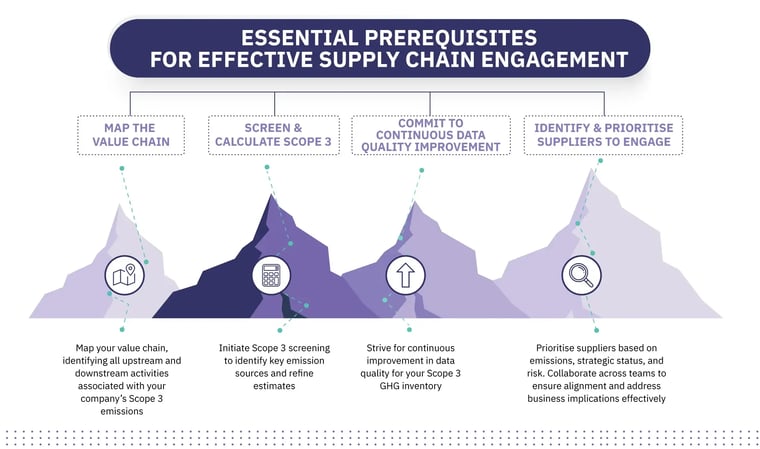Summary
- Scope 3 emissions typically exceed direct operational emissions by 11.4 times, making supplier engagement crucial for comprehensive decarbonization strategies and value chain sustainability efforts.
- Effective supplier engagement requires a systematic approach including comprehensive emissions mapping, precise calculation methods, and collaborative strategies to drive meaningful reduction across the entire supply chain.
- Advanced decarbonization platforms like Terrascope can help businesses streamline Scope 3 emissions management through AI-powered data ingestion, granular emissions measurement, and supply chain collaboration tools.
Introduction
For many companies, managing supply chain emissions, known as Scope 3, is among the most complex challenges in their sustainability and decarbonisation journey. On average, these emissions exceed direct operational emissions by a factor of 11.4. As a result, supplier engagement has become pivotal in driving decarbonisation efforts across a company’s entire value chain.
Establishing an effective supplier engagement programme requires substantial effort, investment, and internal support. Yet, the rewards are substantial. Strengthening supplier relationships enhances efficiency, transparency, and resilience throughout your value chain. It bolsters credibility with key stakeholders – including investors, customers, and employees – who increasingly expect companies to take broader responsibility for their value chain impacts. Most importantly, supplier engagement fosters a positive feedback loop, encouraging more stakeholders to take action on climate change.
But what are the fundamental prerequisites for effective supply chain engagement? We outline four key principles and guidelines below that your company should consider following, to ensure your supplier engagement programme is off to the right start.
Key Prerequisites
1. Map the value chain: Initiate your supplier engagement effort by conducting a comprehensive value chain mapping exercise to understand your company’s Scope 3 emissions. This exercise will enable you to gain a bird’s eye view of your entire supply chain. Review each Scope 3 category defined in the GHG Protocol Corporate Value Chain (Scope 3) Accounting and Reporting Standard and identify the complete list of upstream and downstream activities associated with each.

2. Screen & calculate Scope 3: Conduct a Scope 3 screening to gain an initial estimate of emissions across Scope 3 categories. This process will help your company pinpoint its most significant and material emission sources, offering valuable clues and insights into potential reduction opportunities aligned with your business goals.
After conducting the Scope 3 screening, refine your calculations to obtain more accurate emission estimates. There are a multitude of methods enterprises can use to calculate their Scope 3 emissions, and the GHG Protocol Corporate Value Chain Accounting and Reporting Standard outlines them in detail. Ensure that both direct and indirect procurement activities are included in the calculations and that all tiers of the supply chain are accounted for. This meticulous approach guarantees that your company will possess reliable data to drive your supplier engagement efforts and decarbonisation strategy.
3. Commit to continuous data quality improvement: Strive for continuous improvement in data quality for your Scope 3 GHG inventory. Maintain rigorous data quality standards to support robust supplier engagement, decarbonisation decision-making, and climate reporting. Use the total Scope 3 emissions as the baseline year for reduction targets, ensuring accurate and up-to-date tracking of emission reduction measures over time.
4. Identify and prioritise suppliers to engage: Strategically select suppliers to engage with based on factors such as their emissions contributions, strategic status, GHG program maturity, and risk levels. Utilise the GHG Protocol’s recommended approach of ranking suppliers from highest to lowest according to their portion of total emissions, then select the total number of suppliers that cumulatively achieve your company’s desired Scope 3 emissions coverage.
Additionally, it’s essential to strike a balance in the final selection of suppliers to engage, considering the critical business implications of involving the targeted group. Review and discuss supplier engagement objectives with key stakeholders across your company’s sourcing, procurement, and relevant business teams to ensure alignment and maximise effectiveness.
How Terrascope can help
In a recent report commissioned by Terrascope, Verdantix discovered that 87% of corporate respondents prioritise supplier engagement capabilities when selecting a software provider in the future.
As decarbonisation software powered by the latest advances in machine learning and AI, Terrascope assists enterprises within the ‘Grown Economy’ on their journey towards net zero. These are companies deeply entrenched in value chains reliant on soft commodities like agricultural products or livestock, as well as land use. Despite spanning various industries such as growers, F&B manufacturing, distribution, retail, hospitality, fashion, and luxury goods, they all face a common challenge: grappling with hard-to-abate Scope 3 emissions that constitute the majority of their emissions footprint.
As you seek to jumpstart or refine your supplier engagement programme, don't let Scope 3 data collection and management hold you back. Terrascope offers:
- Seamless data ingestion, collection and management: Terrascope supports seamless data ingestion with advanced processing methodologies to handle diverse data formats, delivering processing speeds five times faster than manual methods.
- Granular emissions measurement and reduction planning: With AI-powered EF matching and hotspot analytics, Terrascope enhances confidence in emissions data and insights. Our proprietary carbon driver tree allows you to visualise and prioritise emissions hotspots and supplier engagement for impactful decarbonisation efforts.
- Deep supply chain and value chain expertise: Terrascope provides an end-to-end platform with tailored features and services for the intricate value chains characteristic of enterprises in the ‘Grown Economy’.
- Better internal and external collaboration: the Terrascope platform streamlines the measurement, tracking, and reduction of Scope 3 emissions, ensuring everyone is on the same page.
- Comprehensive emissions footprinting: Terrascope combines accurate Corporate Carbon Footprinting (CCF) and Product Carbon Footprinting (PCF) on a single platform. We deliver reliable product-level estimates even without primary supplier data, empowering you to analyse dozens or hundreds of products at once using our PCF Calculator.
Engaging suppliers in reducing Scope 3 emissions is crucial for building a data-driven decarbonisation strategy and driving meaningful reductions in your company’s emissions footprint. By leveraging end-to-end decarbonisation software like Terrascope, businesses can unlock numerous benefits, including improved brand reputation, operational efficiency, regulatory compliance, impactful decarbonisation investments and new revenue streams.
Choose Terrascope for emissions footprinting you can trust and act upon.



